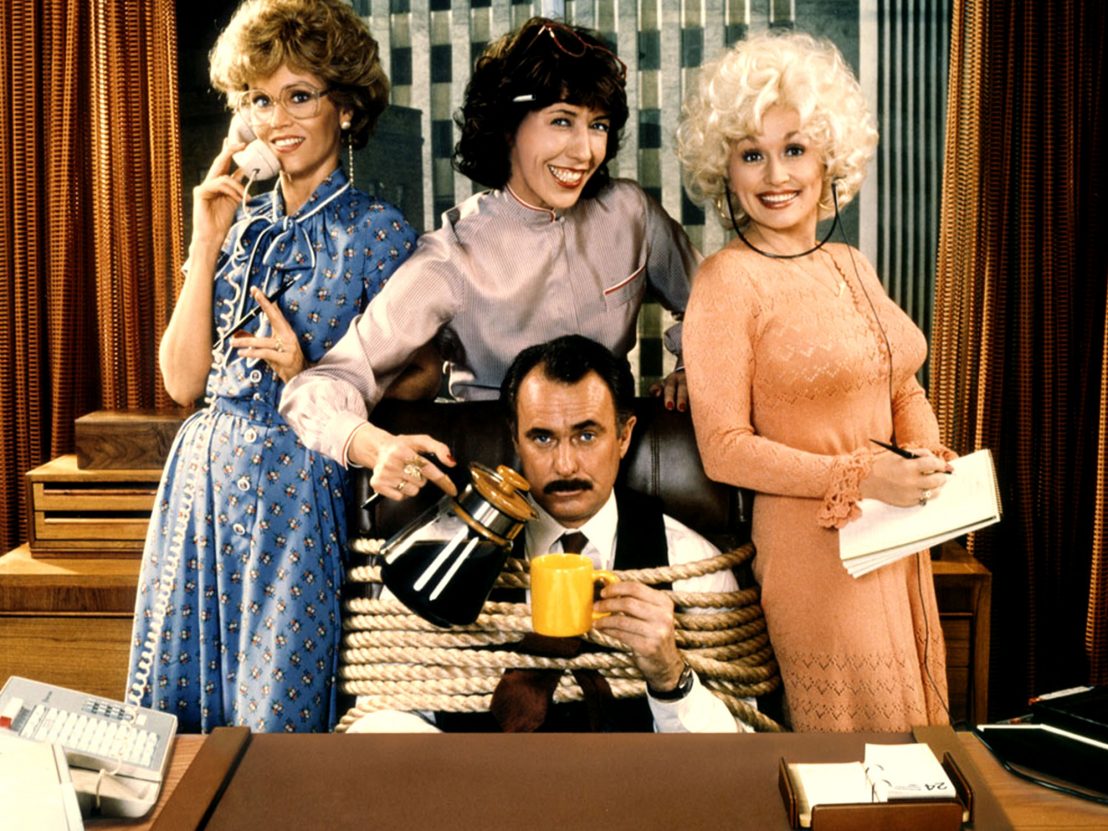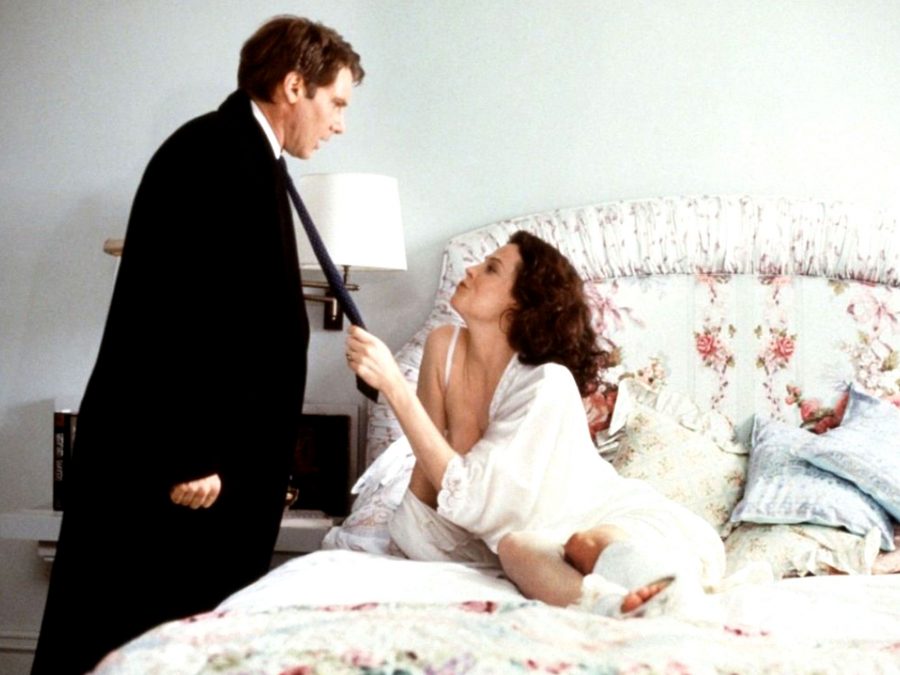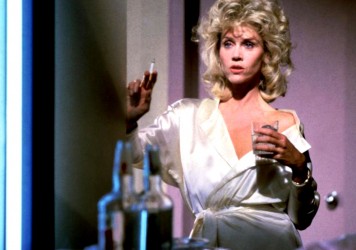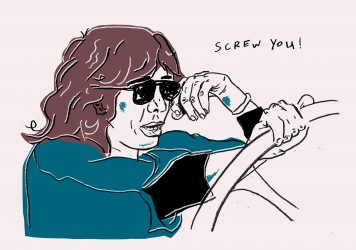
You’re in the same boat / With a lot of your friends
Waitin’ for the day your ship’ll come in / And the tide’s gonna turn / And it’s all gonna roll your way
Dolly Parton sings these words in ‘9 to 5’, the theme song from the 1980 film of the same name. Developed and produced by Jane Fonda, directed by Colin Higgins and co-written by Patricia Resnick, 9 to 5 centres on a trio of female office workers beleaguered by their “sexist, egotistical, lying, hypocritical bigot” of a boss (Dabney Coleman). There is Judy (Fonda), a prim divorcée forced to return to work, Violet (Lily Tomlin), a straight-talking senior employee who watches with gritted teeth as her male colleagues climb the company’s ranks, and Doralee (Parton, in her first feature film role), a buxom blonde on the receiving end of a leering boss and jeering, gossipy co-workers.
The three end up bonding over a shared hatred off their boss, getting stoned and swapping revenge fantasies after work. When Violet accidentally slips rat poison into her boss’ coffee, the girls bandy together to cover up her crime – and, with Coleman’s Franklin Hart, Jr temporarily out of the picture, to implement some serious changes at the office. Equal pay, flexible working hours, a job share programme and a crèche are introduced, with Violet cheekily (albeit unironically) quipping that according to research, “providing adequate benefits contributes to a happier and ultimately more productive workforce”. Her superiors agree – except about the equal pay thing, of course (“that’s got to go).
Released in 1980, 9 to 5 kicked off a run of office comedies about white, white-collar women workers that would continue throughout the decade. These comedies were a direct response to the women’s liberation movement of the 1970s. As women began to grasp newfound social and sexual freedoms, filmmakers began exploring their professional desires, anxieties and oppressions. With its cartoonish humour and slapstick hijinks, the broad comedy of 9 to 5 feels somewhat removed from the workplace-set rom-coms that followed it. Yet what really distinguishes 9 to 5 from later films like Baby Boom or Working Girl is its politics. With its prankish anarchy, sisterly solidarity and unionisation of the workforce, 9 to 5 is a utopian socialist feminist fantasy. Even Parton’s tongue-in-cheek lyrics serve as a playful backslap of anti-capitalist solidarity.
In Baby Boom and opening montage cuts quickly between skyward shots of towering, Manhattan skyscrapers. A stop sign screams ‘DON’T WALK’ but the film immediately establishes that hundreds of sneakered, skirted Wall Street women are doing it anyway. A voiceover confirms the film’s choose-your-own-adventure feminism, explaining that these women are moving “out of the pink ghetto and into the executive suite”. Diane Keaton’s JC Wiatt is one such woman – a high-powered business executive whose self-assigned alias is ‘The Tiger Lady’. When she inherits baby Elizabeth from her deceased cousin, she’s forced to accommodate the child. But by the film’s logic, babies are incompatible with boardrooms and so JC quits her job and buys a fixer-upper in Vermont, where she meets a handsome vet and starts a successful business venture making gourmet baby food.
In her book ‘Backlash: The Undeclared War Against American Women’, Susan Faludi argues that Baby Boom “pretends to reject the ’80s money ethic without ever leaving its orbit”. In other words, JC’s success – financial, familial and romantic – is the result of her ability to redirect her business skills to a “more womanly” but similarly lucrative vocation. But perhaps JC’s domestic exploits reveal more about screenwriter Nancy Meyers (an American classicist of the highest calibre) and her personal fascination with families, interiors and women in the home. In any case, JC doesn’t take to motherhood as comfortably or as quickly as some of the film’s critics suggest.

Baby Boom set a new template for films about working women, swapping out 9 to 5’s socialist feminism for neoliberal choice feminism and economic individualism (also in 1987, anxieties about women’s economic individualism also manifested in Adrian Lyne’s domestic thriller Fatal Attraction). Two years later, Mike Nichols’ Working Girl arrived. With its Staten Island heroine and every(wo)man tagline – ‘For anyone who’s ever won. For anyone who’s ever lost. And for everyone who’s still in there trying’ – the film primarily concerns itself with class. Melanie Griffith stars as Tess McGill, a working class pencil-pusher with “a head for business and a bod for sin” who suffers a string of unsupportive bosses – the most recent of whom is Katharine Parker (a delicious, winking Sigourney Weaver). Bright, pragmatic and powerless, Tess comes up with the ideas but receives none of the credit.
In classic fairy tale fashion, Tess tries out a new job, new clothes and a new boyfriend (played by Harrison Ford on unusually light, good-natured form) – all borrowed from an unsuspecting Katharine, conveniently laid up after a skiing accident. If Tess is Cinderella, Katharine is the wicked stepmother who gets her comeuppance (worth it, though, to see Weaver jabbing her crutches at Griffith in a rare moment of physical comedy for the actress). As Faludi points out, “Tess is allowed to move up the ranks of American business only by tearing another woman down; in 1980s cinema, as in America’s real boardrooms, there’s only room for one woman at a time.”
9 to 5’s emphasis on sisterhood, socialism and solidarity is out; pull-yourself-up-by-your-bootstraps individualism is in (perhaps indicative of the difference between Jimmy Carter’s presidency in 1980 and Ronald Regan’s in 1988). Yet while its politics are imperfect, there’s something to be said for Working Girl’s feminist praxis. Not her petty tussles with Katharine, but rather her conniving commitment to somehow cheating the system and finding a loophole that allows her to approach work in her own way.
“I’m not going to spend the rest of my life working my ass off and getting nowhere just because I followed rules I had nothing to do with setting up,” Tess tells her colleagues in her climactic speech. This rejection of constricting, corporate rules – and an enduring sense of self-made moxie – is the legacy of the ’80s career woman on screen.
Bechdel Test Fest and The Celluloid Sorceress are hosting a double bill of 9 to 5 and Working Girl at the Phoenix Cinema in London on Sunday 5 March. Tickets are available at bechdeltestfest.com
Published 3 Mar 2017

A tribute to some of the most memorable comic turns from women actors, featuring an immortal Meryl Streep.

By Mayukh Sen
Sidney Lumet’s The Morning After sees the acting icon at her brusque, contradictory best.

The doyenne of American comedy and star of Grandma gives a lesson in poetry and swearing.